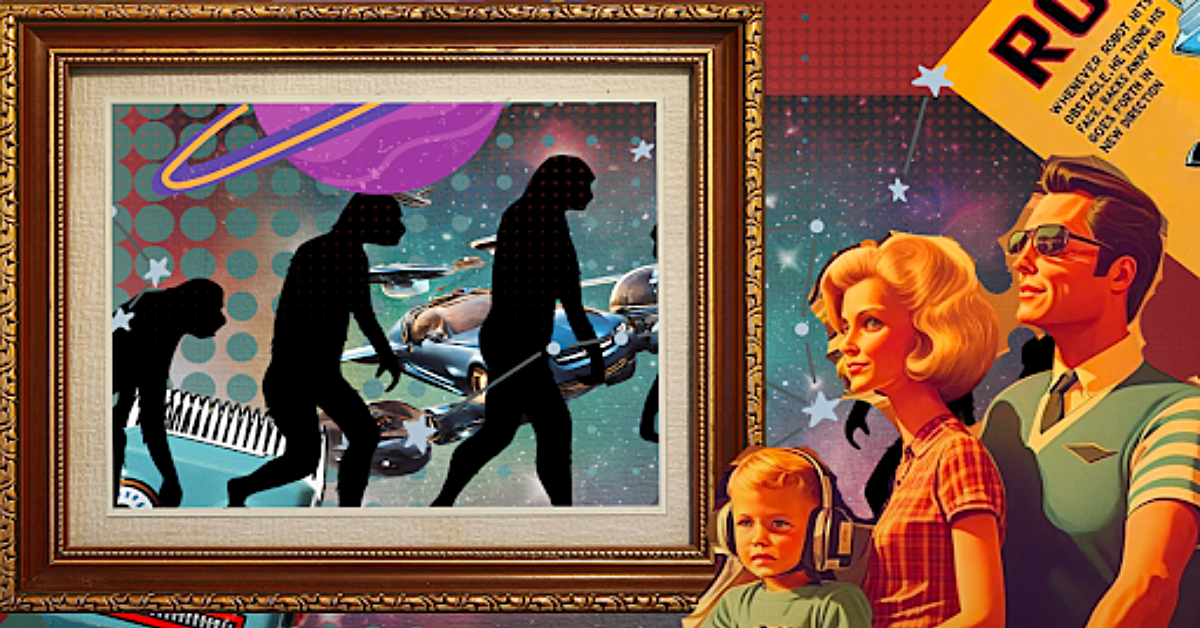
Oct 24, 2023 6:11:19 PM
There’s a way to do it better. Find it.
~ Thomas Edison
We were supposed to have flying cars by now. Instead, refrigerators send us alerts when we’re low on milk.
The course of human history has been defined, in large part, by the tension between two contrasting perspectives: that of the tech pessimist, who fears the uncharted territory that technology could lead us into, and the tech optimist, who envisions a world transformed by the miraculous capabilities of our inventions.
Historically, state fair exhibitions and the vivid imaginings of science fiction enticed us with a vision of the future that was almost romantic. Corporate marketers promised us household appliances that would eradicate the drudgery of daily life and vehicles that would usher us into a new age of convenience. The dream was simple yet profound: in the future, our advanced tools would allow us more leisure, universal contentment, and global harmony as they met everyone's basic needs.
To a significant extent, technoheads delivered on many of those promises. The modern smartphone exemplifies the strides we've made. It's a communication device and a multipurpose tool that doubles as a camcorder, calculator, encyclopedia, music library, and much more. We revel in the benefits of electric vehicles, smart appliances, and groundbreaking medical equipment.

Yet, alongside these technological marvels, we grapple with persistent societal challenges.
Staggering income inequality, foods riddled with carcinogens, and an educational system that often leaves our youth unprepared to discern fact from fiction highlight that while we've mastered technology, we have not yet mastered the art of equitable and holistic progress.
The emergent potential of generative AI further deepens this dichotomy. Its capabilities are undeniable. While remarkable, automation of tasks through platforms like Grammarly, Jasper, and the enhanced Microsoft suite has double-edged implications. For instance, AI expands and makes nearly bionic workers, which can lead to either greater convenience or an inescapable cycle of toxic productivity.
A nagging question tempers my optimism for what technology can achieve: Will these advancements make life qualitatively better for all people equally? Or will they merely compound existing societal divisions? The early days of the internet promised the democratization of information, yet not all segments of society reaped their benefits uniformly. A glaring lack of diversity in tech ominously hints at the pitfalls that might shadow AI's proliferation.
However, there is a blueprint for navigating the impending tech surge.
First and foremost, we must prioritize education, ensuring everyone understands the depth and breadth of AI's influence. Simultaneously, we should empower our youth to be active participants, molding and benefitting from the AI landscape. This involves teaching them about the entrepreneurial and investment avenues AI opens up.
Most crucially, we need to champion algorithmic inclusion. The biases of the physical world should not be replicated in our digital realm. Whether it's search engines that default to white-centric results or technology that inadvertently perpetuates biases, the early stages of tech development should be vigilant in ensuring equitable representation and functionality.
With all its promise and uncertainty, the future beckons us whether we like it or not.
Technology, as always, will be at the forefront of this journey. But it is imperative to remember tech alone does not shape our destiny. Our choices, values, and the principles we stand by will determine whether we leverage technology for the collective good or let it exacerbate existing disparities. The history of the future, ultimately, is ours to write.
An award-winning writer, speaker, and blogger, Chris Stewart is a relentless advocate for children and families. Based in outstate Minnesota, Chris is CEO of brightbeam, a nonprofit media group that runs campaigns to highlight policies and practices that support thriving kids. He was the founding Director of the African American Leadership Forum, was an elected member of the Minneapolis Board of Education, and founded and served as the CEO of Wayfinder Foundation. Above all, Chris is a serial parent, a Minecraft enthusiast, and an epic firestarter on Twitter where he has antagonized the best of them on the political left and right. You’ll often see Chris blogging at citizenstewart.com and “tweeting” under the name “Citizen Stewart.”
Few issues in education spark more tension and debate than standardized testing. Are they a tool for equity or a burden on students? A necessary check on school systems or a flawed measure of...
Charter schools are public schools with a purpose. Operating independently from traditional school districts, they're tuition-free, open to all students, and publicly funded—but with more flexibility...
Despite the benefits of a diverse teaching force, prospective teachers of color fall out of our leaky preparation pipeline at every stage: preparation, hiring, induction, and retention. Here’s what...
Ed Post is the flagship website platform of brightbeam, a 501(c3) network of education activists and influencers demanding a better education and a brighter future for every child.
© 2020-2025 brightbeam. All rights reserved.
Leave a Comment